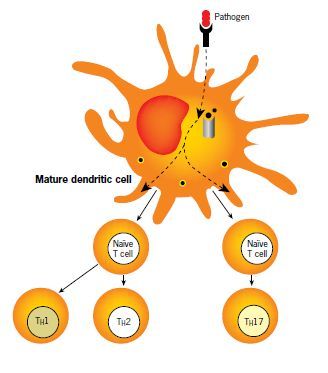Publication
Article
Hemophilia Reports
The Promise of New Targeted Treatment Options
Over the past decade, it has become clear that MS is a predominantly T cell-mediated disease: dendritic cells that direct T cell activity have a critical role in the initiation and progression of disease. Potential autoimmune disease therapies that target dendritic cells aim either to inhibit their immunogenic functions or support their potential to engender T cell tolerance, inhibiting an autoreactive immune response. In patients with MS, both of these outcomes hold promise. So far, none of the approved agents for MS specifically targets dendritic cells, but natalizumab (Tysabri, Biogen Idec), a monoclonal antibody, has a mechanism of action that seems to affect the presence of those cells in cerebral spaces. Also, a number of agents already in phase III trials for treatment of MS have been used to treat other autoimmune diseases. Only one, abatacept (Orencia, Bristol-Myers Squibb), targets T cell activity. Abatacept is currently used to treat rheumatoid arthritis. Other monoclonal antibody agents being tested as MS therapy target B cells.
Researchers continue to pursue dendritic cell-targeted therapies in the belief that they may be able to halt or

retard MS progression. Analyses of infiltratingcells from the brains and cerebrospinal fluid of patients with MS have consistently shown that T cells are associated with inflammatory MS lesions. Furthermore, individual T cell clones have been identified in the blood of patients with MS over long periods of time, and their presence indicates a strong persistent response and ongoing antigen exposure. Dendritic cells are “professional” antigen-presenting cells that can modulate adaptive immune responses. The dendritic cells process antigens, dropping peptide fragments on molecules of naïve T cells. A mature dendritic cell can use this process to direct a naïve T cell to become one or another type of T-helper (TH) cell. For example, one type of TH cell takes on a crucial role in initiating an immune response by guiding immune T cells to locations where such a response is most needed. Dendritic cells can also direct a T cell to become a regulatory agent that is able to inhibit an autoreactive immune response. That particular ability is both valued and known to be present during the steady-state periods of an autoimmune disease. While a steady state is maintained, infection and inflammation are absent, and inappropriate autoimmune responses are quieted.
An understanding of how these cells regulate adaptive immune responses is driving development of a
new generation of immunotherapies. Many of the existing agents now being tested for MS are monoclonal
antibodies, which target molecules that have been selectively expressed by dendritic cells. Earlystage
research may present a targeted approach to modulate the activity of the versatile dendritic cells
themselves.
Sources
• Comabella M, Montalban X, Münz C, Lünemann JD. Targeting dendritic cells to treat multiple sclerosis. Nat Rev Neurol.
2010;9:499-507.
• National Institutes of Health. ClinicalTrials.gov. Available at http://clinicaltrials.gov. Accessed March 13, 2012.
• National Multiple Sclerosis Society. Clinical Trials. Available at: http://www.nationalmssociety.org/research/clinical-trials/index.
aspx. Accessed March 13, 2012.
• Tam S, Lopez A, Shek A, Yeh J. Multiple sclerosis: a paradigm change with oral agents? Formulary. 2011;46:228-240.






